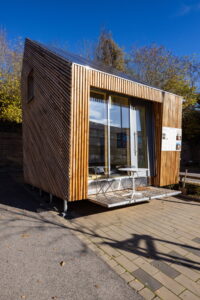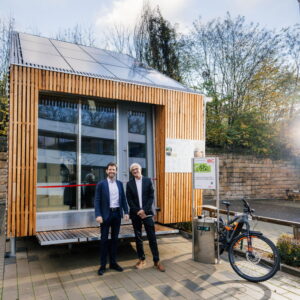 The Tiny House has been in vogue for quite some time. IBC SOLAR was now allowed to participate in a very special project: We supported the construction of a Tiny House at Coburg University of Applied Sciences. The living concept is available to students and guest lecturers throughout the year and shows how energy self-sufficient and CO2-neutral living can be implemented in practice. IBC SOLAR supplied the project with a complete photovoltaic system including storage and actively supported the university in the planning and implementation of the system.
The Tiny House has been in vogue for quite some time. IBC SOLAR was now allowed to participate in a very special project: We supported the construction of a Tiny House at Coburg University of Applied Sciences. The living concept is available to students and guest lecturers throughout the year and shows how energy self-sufficient and CO2-neutral living can be implemented in practice. IBC SOLAR supplied the project with a complete photovoltaic system including storage and actively supported the university in the planning and implementation of the system.
Not only minimalists, but also students, seniors and many others who do not want to spend the majority of their income on rent are enthusiastic about living in a compact format. Another argument in favor of the Tiny House is sustainability, because the desire for self-sufficiency can be realized particularly well in this way. With the help of solar energy and a manageable storage volume, energy self-sufficiency is particularly easy to implement.
Sustainability demonstrated in practice
As part of a project and a summer school initiative in the summer semester of 2021, architecture students from the Design Faculty worked on this exciting practical project under the direction of architecture professor Rainer Hirth and lecturer Anders Macht. The idea was to create a CO2-free experimental building in which energy monitoring can be carried out over several years in an inhabited state. A special feature: The living concept was planned to not only be energy self-sufficient, but also manage without any CO2-emitting building materials.
Successful implementation
The university’s plan was to cover the heating and power supply for the Tiny House using solely the PV system without a grid connection. The surplus solar energy in summer will also be used to charge e-bikes.

IBC SOLAR provided the PV modules, mounting and energy storage solution. 12 IBC SOLAR modules were used for a total of 4.4 kWp, combined with the IBC SOLAR TopFix 200 Eco mounting brackets for trapezoidal sheet metal. The BYD Battery-Box Premium LVS energy storage system provides a storage capacity of 8 kWh. Thanks to the modular design of the storage unit, it could also be expanded in the future if the system were to be extended.
The IBC SOLAR team supported the students in the planning and design of the systems as well as with the implementation and installation on site. A heating system was also connected for the winter, and the first guests have already stayed in the Tiny House. In addition, the project has recently received the CREAPOLIS Award.
Good Collaboration
“We are very happy about the support we received from IBC SOLAR. Without their sponsorship of the system components as well as their consulting and assembly services, we as a university would not have been able to implement such a project,” explains Prof. Rainer Hirth. “In this way the students not only had the opportunity to practice project planning, but also to experience a real-life professional installation.”
“IBC SOLAR is happy to support ambitious student projects, because for a sustainable future we need innovative approaches as well as dedicated engineers, architects and solar installers,” emphasises Dr. Stratis Tapanlis, Director C&I Energy Storage at IBC SOLAR. “We were very impressed by the design of the Tiny House according to cradle-to-cradle principles with renewable raw materials such as straw, wood and clay. A sustainable energy supply is an equally important component for future living concepts and we are very happy to contribute to this goal.”
For more information click here.
I can’t simply go without leaving a comment. This post is a great read. I hope you can take the time to read my post as well (insert article).
Thank you for your insightful comments on our tiny house blog post! I appreciate your engagement and look forward to more discussions.